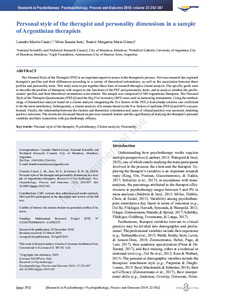Por favor, use este identificador para citar o enlazar este ítem:
https://repositorio.uca.edu.ar/handle/123456789/9595| Campo DC | Valor | Lengua/Idioma |
|---|---|---|
| dc.contributor.author | Casari, Leandro Martín | es |
| dc.contributor.author | Ison, Mirta Susana | es |
| dc.contributor.author | Gómez, Beatriz | es |
| dc.date.accessioned | 2020-03-27T20:45:09Z | - |
| dc.date.available | 2020-03-27T20:45:09Z | - |
| dc.date.issued | 2019 | - |
| dc.identifier.citation | Casari, L.M., Ison, M.S., Gómez, B. Personal style of the therapist and personality dimensions in a sample of Argentinian therapists [en línea]. Research in Psychotherapy: Psychopathology, Process and Outcome. 2019, 22(2). doi:10.4081/ripppo.2019.362 Disponible en: https://repositorio.uca.edu.ar/handle/123456789/9595 | es |
| dc.identifier.issn | 2239-8031 (online) | - |
| dc.identifier.issn | 2499-7552 (impreso) | - |
| dc.identifier.uri | https://repositorio.uca.edu.ar/handle/123456789/9595 | - |
| dc.description.abstract | Abstract: The Personal Style of the Therapist (PST) is an important aspect to assess in the therapeutic process. Previous research has explored therapist’s profiles and their differences according to a variety of theoretical orientations, as well as the association between these profiles and personality traits. This study aims to put together these lines of research through a cluster analysis. The specific goals were to describe the profiles of therapists with respect to the functions of the PST and personality traits; and to analyze whether the professionals’ profiles and their theoretical orientations were related. The sample was comprised of 546 Argentinian therapists. The Personal Style of the Therapist Questionnaire (PST-Q) and the Big Five Inventory (BFI) were used as measuring instruments. Using the methodology of hierarchical analysis based on a cluster analysis integrating the five factors of the PST, a four-cluster solution was confirmed to be the most satisfactory. Subsequently, a cluster analysis of k-means based on the five factors of each test (PST-Q and BFI) was performed. Finally, the relationship between the clusters and theoretical orientation and years of clinical practice was assessed, rendering positive outcomes. The results are discussed based on previous research studies and the significance of studying the therapist’s personal variables and their connection with psychotherapy efficacy. | es |
| dc.format | application/pdf | es |
| dc.language.iso | eng | es |
| dc.publisher | Italian Area Group of the Society for Psychotherapy Research | es |
| dc.rights | Acceso abierto | * |
| dc.rights.uri | http://creativecommons.org/licenses/by-nc-sa/4.0/ | * |
| dc.source | Research in Psychotherapy: Psychopathology, Process and Outcome. 2019, 22(2) | es |
| dc.subject | PSICOTERAPEUTAS | es |
| dc.subject | ESTILOS PERSONALES | es |
| dc.subject | PERSONALIDAD | es |
| dc.title | Personal style of the therapist and personality dimensions in a sample of Argentinian therapists | es |
| dc.type | Artículo | es |
| dc.identifier.doi | 10.4081/ripppo.2019.362 | - |
| uca.disciplina | PSICOLOGIA | es |
| uca.issnrd | 1 | es |
| uca.affiliation | Fil: Casari, Leandro Martín. Pontificia Universidad Católica Argentina. Facultad de Humanidades y Ciencias Económicas; Argentina | es |
| uca.affiliation | Fil: Casari, Leandro Martín. Consejo Nacional de Investigaciones Científicas y Técnicas; Argentina | es |
| uca.affiliation | Fil: Ison, Mirta Susana. Consejo Nacional de Investigaciones Científicas y Técnicas; Argentinas | es |
| uca.affiliation | Fil: Gómez, Beatriz. Fundación Aiglé; Argentina | es |
| uca.version | publishedVersion | es |
| item.fulltext | With Fulltext | - |
| item.languageiso639-1 | en | - |
| item.grantfulltext | open | - |
| crisitem.author.dept | Facultad de Humanidades y Ciencias Económicas (Mendoza) | - |
| crisitem.author.orcid | 0000-0002-0139-0798 | - |
| Aparece en las colecciones: | Artículos | |
Ficheros en este ítem:
| Fichero | Descripción | Tamaño | Formato | |
|---|---|---|---|---|
| personal-style-therapist-personality.pdf | 618,25 kB | Adobe PDF |  Visualizar/Abrir |
Visualizaciones de página(s)
140
comprobado en 27-abr-2024
Descarga(s)
351
comprobado en 27-abr-2024
Google ScholarTM
Ver en Google Scholar
Altmetric
Altmetric
Este ítem está sujeto a una Licencia Creative Commons

